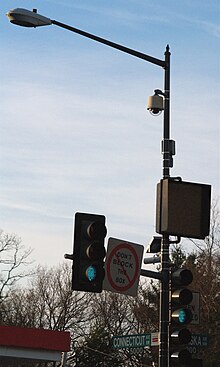
Back Waarneming AF مراقبة Arabic Nəzarət AZ Vigilància Catalan Sledování Czech Overvågning Danish Überwachung German Gvatado EO Vigilancia Spanish Varjatud jälgimine ET
This article appears to be slanted towards recent events. (June 2024) |


Surveillance is the monitoring of behavior, many activities, or information for the purpose of information gathering, influencing, managing, or directing.[1][2] This can include observation from a distance by means of electronic equipment, such as closed-circuit television (CCTV), or interception of electronically transmitted information like Internet traffic. Increasingly, governments may also obtain consumer data through the purchase of online information, effectively expanding surveillance capabilities through commercially available digital records.[3] It can also include simple technical methods, such as human intelligence gathering and postal interception.
Surveillance is used by citizens, for instance for protecting their neighborhoods. It is widely used by governments for intelligence gathering, including espionage, prevention of crime, the protection of a process, person, group or object, or the investigation of crime. It is also used by criminal organizations to plan and commit crimes, and by businesses to gather intelligence on criminals, their competitors, suppliers or customers. Religious organizations charged with detecting heresy and heterodoxy may also carry out surveillance.[4] Auditors carry out a form of surveillance.[5]
Surveillance can unjustifiably violate people's privacy and is often criticized by civil liberties activists.[6] Democracies may have laws that seek to restrict governmental and private use of surveillance, whereas authoritarian governments seldom have any domestic restrictions.
Espionage is by definition covert and typically illegal according to the rules of the observed party, whereas most types of surveillance are overt and are considered legal or legitimate by state authorities. International espionage seems to be common among all types of countries.[7][8]
- ^ Lyon, David (2001). Surveillance Society: Monitoring in Everyday Life. Philadelphia: Open University Press. ISBN 978-0-335-20546-2.
- ^ Monahan, Torin; Murakami Wood, David (2018). Surveillance Studies: A Reader. New York: Oxford University Press. ISBN 9780190297824.
- ^ Fung, Brian (January 26, 2024). "The NSA buys Americans' internet data, newly released documents show | CNN Business". CNN. Retrieved October 30, 2024.
- ^
Greenleaf, Richard E. (2018). "Historiography of the Mexican Inquisition: Evolution of Interpretations and Methodologies". In Perry, Mary Elizabeth; Cruz, Anne J. (eds.). Cultural Encounters: The Impact of the Inquisition in Spain and the New World. Center for Medieval and Renaissance Studies, UCLA. Vol. 24. Berleley: University of California Press. p. 260. ISBN 9780520301245. Retrieved March 14, 2020.
Studies [...] are based partially on Inquisition surveillance of foreigners and Protestants.
- ^
Cardwell, Harvey (2005). Principles of Audit Surveillance. R.T. Edwards, Inc. p. 102. ISBN 9781930217133. Retrieved March 14, 2020.
[...] accounts and inventories alike are generally within the area of surveillance of the auditor [...].
- ^ Stallman, Richard M. (October 14, 2013). "Stallman: How Much Surveillance Can Democracy Withstand?". Wired. ISSN 1059-1028. Retrieved April 15, 2020.
- ^ "The Psychology of Espionage" (PDF). The Psychology of Espionage. Archived (PDF) from the original on November 9, 2020. Retrieved October 1, 2022.
- ^ Radsan, A. John (Spring 2007). "The Unresolved Equation of Espionage and International Law". Michigan Journal of International Law. 28 (3): 595–623.